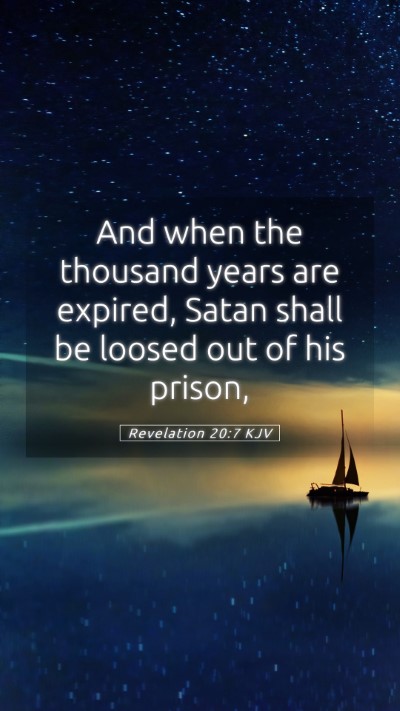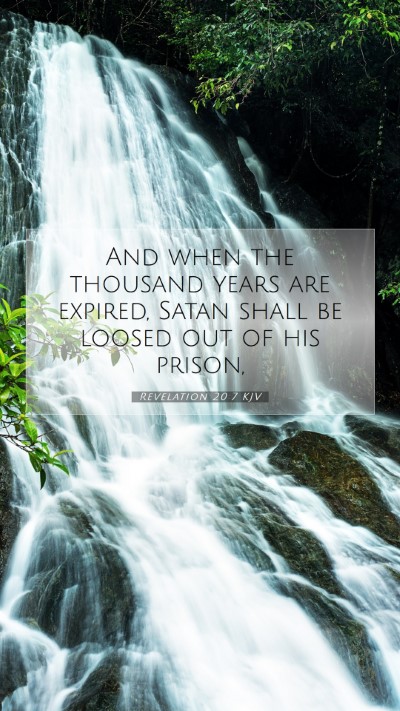Understanding Revelation 20:7
Introduction
Revelation 20:7 is a significant verse in the context of eschatological studies within the Bible. This verse speaks to the final rebellion of Satan after a thousand years of Christ's reign. Here, we will explore the Bible verse meaning, Bible verse interpretations, and Bible verse commentary related to this passage, drawing insights from renowned public domain commentaries by Matthew Henry, Albert Barnes, and Adam Clarke.
Context of Revelation 20:7
Before diving into the specific verse, it is crucial to understand its placement within the broader narrative of Revelation. It marks the closing events of history and serves as a pivotal moment in God's plan for humanity.
Verse Text
"And when the thousand years are expired, Satan shall be loosed out of his prison." (Revelation 20:7)
Meaning and Commentary Overview
- Historical Context: This verse signifies the end of a millennium during which Satan is bound, as previously stated in Revelation 20:2-3. After this period, there is a significant release, which leads to a final confrontation.
- Significance of "Satan's Release": Henry elucidates that this release serves a divine purpose. It allows for the final test of humanity’s loyalty to God and showcases the ultimate defeat of evil.
- The Nature of the Rebellion: Barnes indicates that the release of Satan results in an uprising among the nations. This will serve to reveal the unregenerate hearts of humanity.
- Application to Daily Life: Clarke emphasizes the importance of vigilance. Just as Satan is released to tempt and deceive once more, believers must remain steadfast in their faith and resist temptations.
- Theological Implications: This verse illustrates themes of good versus evil, divine justice, and the eventual triumph of God’s kingdom. It discusses a time when evil seems to rise again but ultimately falls under God's sovereignty.
Detailed Exegesis
According to Matthew Henry, the release of Satan represents a testing period. The thousand years preceding this event are characterized by Christ’s reign, where peace and righteousness prevail. Henry notes that this showcases God’s mercy in allowing humanity the opportunity to choose, even at the end of a grace-filled era.
Albert Barnes further adds that the nations being deceived symbolizes the ongoing struggle against sin and the spiritual warfare inherent in humanity. The ending of this peaceful reign serves as a poignant reminder of the human heart's inclination to rebellion even after experiencing divine grace.
Adam Clarke correlates the loosing of Satan with the urgency of evangelism and the call to holiness. He stresses that the time leading up to Christ's return requires believers to witness and live righteously, mindful of the adversary's tactics.
Related Bible Cross References
- Revelation 20:2-3 - Binding of Satan
- 2 Peter 2:4 - God’s judgment on the fallen angels
- Ephesians 6:12 - Spiritual warfare and the nature of our struggle
- Revelation 20:10 - The ultimate fate of Satan
- Matthew 24:24 - Deception in the last days
Concluding Insights
This verse serves not only as a prophetic proclamation but also as a call to ongoing spiritual vigilance. Understanding the meaning of Bible verses such as Revelation 20:7 allows us to appreciate the profound truths embedded in Scripture and their implications for our lives today.
As we engage in Bible study, utilizing resources and materials designed to deepen our understanding, let this verse challenge us to remain faithful, prepared, and insightful against the schemes of the enemy.


